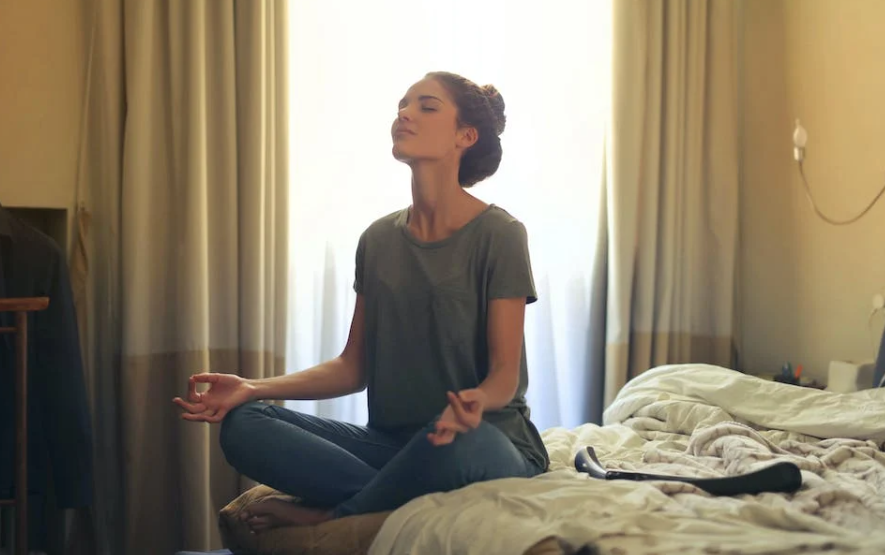Will Meditation Help Me Sleep?
If you have trouble sleeping at night learn the power of meditation to help you sleep.

Selfpause Affirmation App
Download the app to get 1,000’s of affirmation meditations and everything you need to write, record and listen to your own.
If you have trouble sleeping at night, you might be wondering if Meditation can help. While it will improve your nighttime routine, it may not be the best solution to your insomnia. This article will discuss how Meditation can help you sleep and whether it’s suitable for your specific needs. It’s important to note, however, that Meditation does not work for everyone.
Meditation can help you fall asleep

If you’ve always struggled to fall asleep, meditation could be the answer. Studies have shown that it can help you relax and fall asleep faster. In addition, it can reduce stress and anxiety. It also increases the level of melatonin in your body, which promotes sleepiness. Meditating regularly can help you fall asleep more easily and wake up fewer times during the night.
Many meditators find that the act of sitting in silence is soothing and helps them fall asleep. It may also help them focus. While meditation can help you fall asleep, there are many factors that can affect your ability to fall asleep. For example, the type of meditation you practice will determine whether or not you will fall asleep during it.
Another reason that meditation can help you fall asleep is that it helps you build a mindful mindset. Meditation training trains the mind to become more present, and this helps you deal with racing thoughts and anxiety. By practicing mindfulness, you can learn to recognize and acknowledge these thoughts without spiraling. Practicing meditation regularly can increase the amount of mindfulness you have, and this can help you fall asleep quicker.
Ideally, you should start your meditation session before you go to bed. However, you should avoid doing it minutes after you wake up, as this will affect your digestion and make it difficult for you to fall asleep. For beginners, you may want to do some other relaxing activities before you start the session. When practicing meditation, you should make sure the room is dark, without glaring lights or distractions. You should also close your cell phone and avoid distractions such as the television.
Whether you’re suffering from anxiety, or depression, or simply want to sleep better, meditation can help. This ancient technique can help you relax and fall asleep without the use of medication. It is easy to practice and requires no special equipment. However, it is important to practice in order to establish a routine.
You can choose the type of meditation you prefer. You can do it sitting, standing, or lying down. If you find it difficult, you can take a class or join a group meditation in your local area. There is no particular time limit for practicing meditation, and you can meditate for as little as 10 minutes or up to an hour. However, it is more effective for you to do it before you go to sleep.
Meditation improves sleep quality

Meditation is a proven method for improving sleep quality. It triggers a relaxation response, which activates the parasympathetic nervous system, which is responsible for rest and healing. It also decreases stress hormones in the blood. In a recent study, long-term meditators had fewer sleep disturbances than novices. This was based on measures of high-density electroencephalography (EEG), which measures brain waves.
Meditation improves sleep quality by increasing slow-wave sleep and decreasing nocturnal awakenings. Additionally, it can improve your emotional health by increasing awareness of your negative thoughts and behavior. Meditation can be used on its own, or in combination with other sleep-improving techniques. Some studies have shown a positive impact on people suffering from insomnia and other conditions related to sleep loss.
Another benefit of meditation is that it relaxes the mind and body, which lowers the levels of the sympathetic nervous system, the part of the brain responsible for the fight-or-flight response to stress. The reduced activity of the sympathetic nervous system during meditation improves sleep quality and helps you recognize stressful patterns and reduce them. This is important because chronic stress can severely reduce sleep quality.
One type of meditation is mindfulness meditation. Mindfulness is awareness of the present moment. Meditation is an effective way to focus on the present moment. This form of meditation usually involves focusing on breath, body sensations, sounds, and thoughts. It is also proven to reduce ruminative thoughts. Several studies have shown that mindfulness meditation reduces stress and anxiety.
In addition to improving sleep quality, meditation has numerous other benefits. It has been shown to improve attention, reduce anxiety, and improve the way we treat others. One study also found that mindfulness meditation improved the amount of sleep a person gets each night. It is also helpful for chronic insomnia sufferers. It can also reduce daytime disruptions.
Meditation may not work for everyone

Meditation may not be for everyone, but for some people, it can be a very helpful way to deal with stress and improve their memory. The benefits of meditation can be numerous, including the reduction of cognitive rigidity, increased concentration, and improved problem-solving. It has also been shown to improve memory recall. It increases cerebral blood flow and gives the brain a “workout,” making it easier for the brain to remember information.
Among other benefits, meditation can affect the way people interact. In one study, half of the participants felt socially impaired after practicing meditation. They reported difficulty in integrating back into society and some of them felt that their social impairment negatively affected their occupations. Nonetheless, these findings are not the only negative effects of meditation.
One way to overcome these problems is to be gentle with your mind. You can avoid letting it distract you by gently guiding it back to your meditation focus. Even long-term meditators will admit that their mind will continue to chatter, but if you practice mindfully and consistently, it will get easier to achieve this goal.
Despite its positive effects on the brain and emotions, meditation may not be suitable for everyone. Some people experience delusional, irrational, and paranormal thoughts as a result of the practice. Others may suffer from a lack of self-awareness or even depression. In extreme cases, the effects of meditation can be disastrous.
There are many benefits to meditation. The benefits range from decreased stress to increased concentration. The practice can also improve one’s emotional health and help one focus at work. In addition, meditation may improve one’s focus and diminish negative mental states. In the end, it can help one become more aware of themselves and their own true self.
Meditation may not work for everyone with insomnia

Meditation can be very effective in helping people who suffer from insomnia, but it may not be a cure-all for all individuals. Some people may experience a higher level of arousal during the night, while others may experience a reduction in sleep quality. The process of meditation requires practice and can take many forms.
Meditation helps people who experience insomnia relax by focusing on the present moment. It works by allowing the mind to relax and release unwanted emotions. However, some people find listening to other people’s voices distracting, which makes it difficult to focus. There are several types of meditation, including mindfulness meditation and body scan meditation. In fact, a study published in the Journal of the American Medical Association found that mindfulness meditation can be effective in treating insomnia in older adults.
Meditation is an excellent option for people with insomnia, as it can be learned quickly. In addition to helping people sleep, it also can help people improve their overall health. There are several methods of meditation that can be practiced before bed, including guided meditation and mindfulness meditation. You may also want to try mantra meditation, which involves repeating a positive syllable to yourself, and mindfulness meditation, which teaches you to pay attention to your thoughts and feelings without judging them. However, these methods may not work for everyone with insomnia, so it is best to seek out professional advice from a qualified physician first.
Luckily, meditation can help many people with insomnia and can improve both the quantity and quality of sleep. The key is to learn how to meditate properly so that it can provide the most benefit. It is important to follow certain rules and guidelines to ensure that they will help you fall asleep and stay asleep.
There are many different ways to meditate, but most people simply sit or lie down in a comfortable position. Close your eyes and try to clear your mind. If you have trouble getting started, you may want to consider joining a meditation group or taking a meditation class. There is no set time limit for meditation and you can meditate for a few minutes or for as long as you need. Some people report having better sleep with just ten to thirty minutes of meditation, which may be enough to get the benefits you need.
Our Top FAQ's
Research has shown that meditation can improve the quality of sleep. Some studies have found that regular meditation can help to reduce insomnia and improve overall sleep quality. Additionally, meditation can help to reduce stress and anxiety, which are common causes of sleep disturbances.
Different types of meditation can have different effects on sleep. Some people find that mindfulness meditation, which involves focusing on the present moment, can be helpful for promoting sleep. Others may find that practices like progressive muscle relaxation or guided imagery are more effective for them. It may be helpful to experiment with different types of meditation to see which one works best for you.
The length of time that you should meditate before bed will vary depending on your individual needs and preferences. Some people may find that just a few minutes of meditation is enough to help them relax and sleep better, while others may need to meditate for longer periods of time. It may be helpful to start with a shorter meditation and gradually increase the length of time as you become more comfortable with the practice.
Meditation can be an effective tool for managing chronic sleep problems, such as insomnia. Research has shown that regular meditation can help to reduce the symptoms of insomnia and improve overall sleep quality. Additionally, meditation can help to reduce stress and anxiety, which are common causes of chronic sleep problems.
There are generally no major drawbacks or risks to using meditation as a sleep aid. However, it’s important to remember that meditation is not a substitute for medical treatment. If you are experiencing chronic sleep problems or other health issues, it’s important to consult with a healthcare provider to determine the best course of action. Additionally, some people may find that meditation makes them feel more alert or energized, which can be counterproductive for sleep. In these cases, it may be helpful to try other relaxation techniques or sleep aids.
